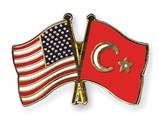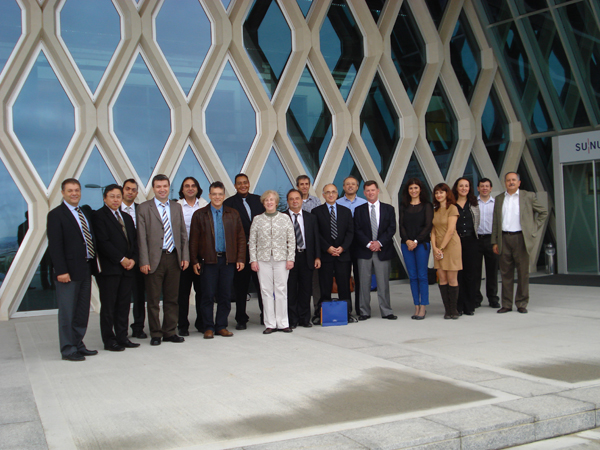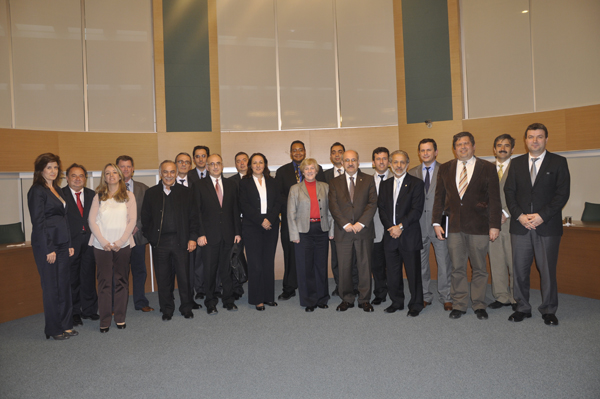USA-TR Joint Commission Meeting on S &T Cooperation
by Candan Tamerler
 Sandy left absolute devastation in Nation. Sandy's flight impacts not only felt in the US but also overseas for days. After months of preparation for the Nov 1st and 2nd Joint Commission Meeting (JCM) on Science and Technology Cooperation between USA-Turkey, the meeting has been cancelled and it will be rescheduled in the New Year. The meeting is planned to host the first high level official meeting between the two countries. As the meeting plans were shaping up in the USA site, TASSA actively started to play a key role to build up strong and lasting ties in the new initiatives.
Sandy left absolute devastation in Nation. Sandy's flight impacts not only felt in the US but also overseas for days. After months of preparation for the Nov 1st and 2nd Joint Commission Meeting (JCM) on Science and Technology Cooperation between USA-Turkey, the meeting has been cancelled and it will be rescheduled in the New Year. The meeting is planned to host the first high level official meeting between the two countries. As the meeting plans were shaping up in the USA site, TASSA actively started to play a key role to build up strong and lasting ties in the new initiatives.
JCM initiatives have been co-chaired by the representatives from Office of Science and Technology Cooperation, U.S. Department of State and TUBITAK. Chairs were assigned for the different working groups with respect to each country’s area of interests to build up the S&T bridges. The working groups started their discussions by exchanging ideas over emails or teleconference meetings include:
- Biomedical Research (US Co-Chair: Dr. Ted Trimble, NCI - Turkish Co-Chair: Prof. Mehmet Ozturk, Bilkent University);
- Engineering or a Sustainable Future (US-Co-Chair: Dr. Sohi Rastegar, NSF - Turkish Co-Chair: Prof. Pinar Menguc, Özyeğin University);
- Material Sciences (US-Co-Chair: Dr. Sofi Bin-Salamon, AFOSR - Turkish Co-Chair: Dr. Bahadır Tunaboylu, Marmara Research Center Materials Institute TÜBİTAK)
- Energy Research (U.S. Co-Chair Dr. Srinivas Mirmira, Department of Energy - Turkish Co-Chair Dr. Cengiz Güngör, Marmara Research Center Energy Institute, TÜBİTAK)
- Innovative Technologies in Agricultural Research Working Group (U.S. Co-Chair Dr. Greg Crosby, NIFA - Turkish Co-Chair Prof. Hikmet Budak, Sabancı University)
- Education and Educational Technologies (U.S. Co-Chair Dr. Barbara Olds, National Science Foundation - Turkish Co-Chair Dr. Selcuk Ozdemir, Science and Society Department, TÜBİTAK
- Natural Hazards with a focus on seismology and earthquake hazard mitigation (U.S. Co-Chair Dr. Mike Foose, Office of the Director, International Programs, U.S. Geological Survey - Turkish Co-Chair Prof. Mustafa Erdik, Kandilli Observatory and Earthquake Research Institute, Bogazici University)
In addition to these areas, discussions are planned to include: “Innovation Ecosystem” on networking and connectivity between government, academia, and the private sector and “Horizontal Issues in Science, Technology and Innovation Policy and Implementation” on standard settings, science policy decision making, virtual networks, university partnerships and science diaspora. These working groups’ discussions will continue all-around the New Year.
Despite the fact that the JCM meeting was cancelled, some of the working groups could still continue on their planned activities. As the Sandy was hitting the east coast, some of the US delegation team members either arrived to Ankara or were on the way to Ankara. Dr. Brian Carter (US Department of State- OES/STC) has done an amazing job on updating all the members and continuously re-arranging the planned meetings in Ankara. Among these “Natural Hazardous” and “Education and Educational Technologies” groups could meet to go over the possible collaboration areas in condensed 1-2 days meetings on Nov 1-2 in Ankara. The Materials Research Working group lead by Dr. Sofi Bin-Salamon from the International Office of the Air Force Office of Scientific Research (AFOSR) held their original planned program over the 10 days persistently.
AFOSR lead Materials Science Working Group US delegation team members chaired by Dr. Sofi Bin-Salamon include Dr. Ali Sayir and Dr. Mitat Birkan, Program Managers in Air Force Office of Scientific Research (AFOSR); Colonel Cynthia Bedell, the commanding Officer for Research Development and Engineering Command Forward Element- Atlantic in U.S. Army Research and Development and Engineering Command (RDECOM); Commander Mark Williams, the program manager responsible for Europe, Turkey, Middle East and North Africa from the Office of Naval Research Global (ONRG); Dr. Larry Nagahara (NCI-NIH) and Prof. Candan Tamerler (TASSA and University of Washington). Turkish site in the Material Working Group were chaired by Dr. Bahadir Tunaboylu (TUBITAK-Materials Research Institute). In addition to the meeting in TUBITAK-Ankara, the US/Turkey Materials Working Group Site Visits were organized by Co-Chairs to meet with different research groups in Ankara and Istanbul.
Ali Riza Ozdemir who is the Acting Head of the International Cooperation Department at TUBITAK opened up the Materials Working Group meeting in Ankara. There were several presentations on TUBITAK and the participant institutions as well as the ongoing research interests introduced by the Turkish participants. US delegation team members presented their agencies and introduced their funding programs. Dr. Katya M. Delak, international officer at NIST introduced ongoing NIST activities with a number of countries. In addition to TUBITAK meeting in Ankara, the US team members visited Materials Engineering Department in METU and The National Nanotechnology Center (UNAM) in Bilkent University. TUBITAK-MAM was the first stop in Istanbul visits. In addition to the visits of the labs, the group discussions took place with the participants from “Chemistry”, “Energy”, “Materials” and “Genetic Engineering and Biotechnology” Institutes. SUNUM, Nanotechnology Research and Application Center in Sabanci University was the next stop in Istanbul. The center presentations and the lab visits provided the active discussions among the Turkish and US team members. Another Research Center visited in Istanbul was in Gebze Institute of Technology and where the ongoing research, project and proposal mechanisms were discussed. In Istanbul Technical University, different research units were visited including Energy Institute, Materials, Nanotechnology and Molecular Biology-Biotechnology and Genetics Research Centers. Ongoing research activities were followed by the discussions on the collaboration areas and technology needs. The final stop for the Materials Working Group was Yildiz Technical University.
In all of these visits, US team continuously introduced their agencies and shared the funding mechanisms that are available for Turkish Scientists. These funding mechanisms were new to many Turkish Scientists; consequently they were followed by many questions. Mostly, they were compared to the existing joint programs launched by TUBITAK and NSF or NIH. Their readiness for the Turkish Scientists` applications gathered a high interest among the researchers. The common questions included the application procedures, format of the proposals and the IP issues. One important observation was that the Turkish Scientists were mostly focusing on the applied science and technology areas until they started their discussions with the program directors. The common denominator brought by the US agencies is that they can support basic science all around the world and the IP belongs to PI and/or project team members. The philosophy was introduced by US team members to Turkish Scientists: The Bests in Ideas, Science and Scientists can be anywhere as elegantly put by Colonel Cynthia Bedell and the key is to find them to impact science globally. As Dr. Ali Sayir mentioned many times they fund the scientists whose works open new paths, gets citations by Nobel Laureates in Science. As TASSA, we value very much the extensive efforts made by the US delegation team members during these site-visits. Their enthusiasms were very high to reach out to Turkish Scientists. We believe that these efforts will be well taken by Turkish Scientist to build up science and technology bridges between USA and Turkey.
There are more planned activities in the working groups to hold as many teleconference discussions in the next upcoming months to formulate a clear action plan to guide the work of their group over the next two years. TASSA technical committees will be instrumental in these working groups, building up the networks of science, engineering and scholar Diasporas, leveraging existing collaborations while expediting new ones. We hope that individual TASSA members as well as our institutional members from both countries will see the opportunities to get involved within the working groups or suggest areas for the next years.
TASSA continues to actively involve in building bridges.

Visit to Sabanci University

Visit to Istanbul Technical University